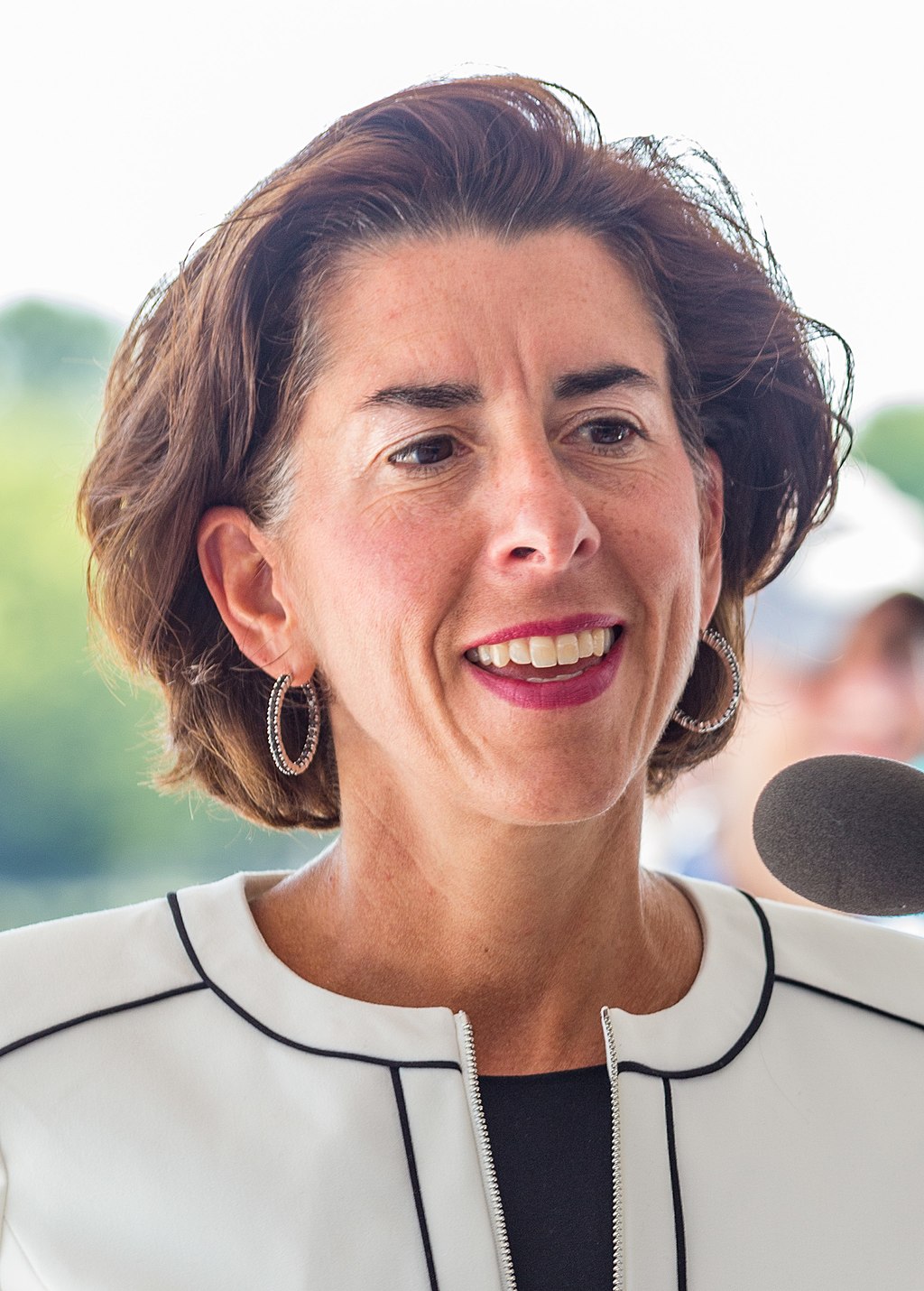President-elect Joe Biden on Friday tapped Rhode Island Gov. Gina Raimondo to head the Department of Commerce, an agency that will take a leading role in his administration’s priority issues around the economy, environment and climate.
Raimondo, 49, was born and raised in Rhode Island and is the state’s first female governor. With a business background in the financial industry, she is seen as firmly in the centrist wing of the Democratic party, despite Republican critics’ contention that the state has been less business-friendly under her administration.
As secretary of Commerce, Raimondo’s portfolio includes agencies like the National Marine Fisheries Service and weather and climate science offices. She will be at the forefront of the Biden administration’s policies on trade.
She is a “daughter of a working-class family who knows what it was like to have a job shipped off to China,” Biden said Friday at a press conference in Wilmington, Del. He called Raimondo “one of the most effective, forward-looking governors in the United States,” who has “put Rhode Island on the path to achieving 100 percent renewable energy.”
Raimondo and her allies have ardently pursued offshore wind energy as a growth industry for Rhode Island, where the 30-megawatt Block Island Wind Farm was built in 2016 as a commercial-scale pilot project.
That established the state as a base for wind power support services. Blount Boats in Warren, R.I., built the first U.S.-flag crew transfer vessels, operated by Atlantic Wind Transfers in North Kingston, R.I., setting the stage for the state to be a major base for wind development off southern New England.
That has also raised conflicts with the state’s commercial fishing industry – particularly the squid fleet, where captains say proposed turbine arrays could utterly disrupt their fishing patterns.
National advocates for the fishing industry praised the choice of Raimondo, while calling for her to steer a path that will allow both industries to co-exist.
“In light of the increasing number of proposed actions in our federal waters, we sincerely hope Governor Raimondo’s experience working with the commercial fishing industry in Rhode Island will guide her in ensuring our businesses continue to thrive,” said Leigh Habegger, executive director of the Seafood Harvesters of America, in a statement late Thursday as news emerged that Raimondo would be Biden’s choice.
“In particular, her leadership on the Special Area Management Plan (SAMP) will be useful as the Commerce Department navigates ambitious offshore wind goals. We look forward to her swift confirmation and working with Ms. Raimondo and the Department of Commerce on ensuring that our commercial fishermen have a seat at the table during these, and other fisheries management, discussions,” said Habegger.
“It is my sincere hope that Governor Raimondo carries with her the experiences and lessons learned from her time in Rhode Island,” said Christopher Brown, a Rhode Island captain and founding president of Seafood Harvesters of America.
Raimondo “will have to find a harmonious existence for both the fishing industry and the offshore wind industry. Hopefully her time in Rhode Island has granted her the wisdom to make sound choices to ensure the delivery of both,” said Brown. ‘I hope that the commercial industry doesn't become collateral damage of greater blind ambition.”
National Fisheries Institute President John Connelly called Raimondo an innovator capable of balancing the needs of conservation and commerce.
“We are encouraged that President-elect Biden has chosen a policymaker from a coastal state, who knows the importance of harvesting and the full seafood supply chain, for this leadership position,” Connelly said in a statement.
Critics of the Trump administration’s initiatives to promote finfish farming in federal waters, organized as the Don’t Cage Our Ocean Coalition, made their own policy pitches.
“As Secretary of Commerce, Governor Raimondo will be responsible for fostering a sustainable domestic seafood market to meet the needs of U.S. consumers,” said Rosanna Marie Neil, policy counsel for Northwest Atlantic Marine Alliance. “This year, independent fishing businesses have been hit hard by the pandemic, and I urge Governor Raimondo to ensure that these existing small businesses, which are so essential to the health and prosperity of local communities, are supported.”
“I urge Governor Raimondo to turn the page on the past administration’s unpopular agenda to push development of an unnecessary and unwanted marine finfish farming industry in the U.S.,” said Marianne Cufone, Executive Director of Recirculating Farms. “It’s long past time for our Commerce leaders to prioritize sustainable seafood production over the profits of corporations that will likely bring health risks and pollution to our coastal communities and little else.”
“Our oceans are a precious resource, and we hope that Governor Raimondo leads NOAA in protecting the health of our marine ecosystems that so many independent fishing and tourism businesses depend on,” said Hallie Templeton, senior oceans campaigner for Friends of the Earth. “Many existing commercial fishing businesses use sustainable methods to minimize their environmental impact, and our government should be supporting these efforts and rejecting corporations’ attempts to industrialize our oceans.”
Steve Bittenbender of Seafood Source contributed to this story.







